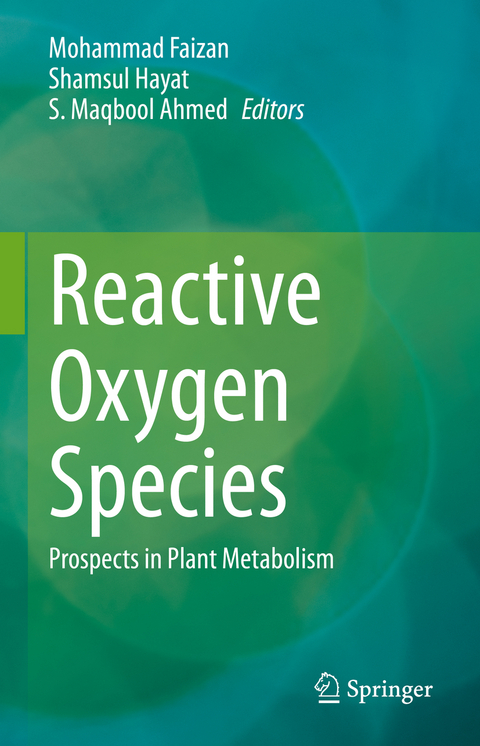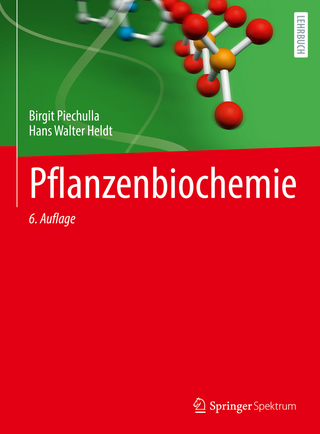
Reactive Oxygen Species
Springer Verlag, Singapore
978-981-19-9793-8 (ISBN)
This book brings together a compilation of latest research work on reactive oxygen species and their emerging importance.
This edited book focuses on ROS synthesis, potential applications, toxicity, and preservations. It explores the recently proposed hormonal response and biomolecules targeted in regulation of ROS. Chapters cover resistance and susceptibility to plant pathogen, strategies involving phytoprotectants, and life span of nematode affected by ROS. This book includes a compilation of recently written, integrated, and illustrated reviews describing latest information on ROS. Chapters incorporate both theoretical and practical aspects of plant ROS.
Reactive oxygen species (ROS) are key signaling molecules involved in the redox equilibrium and biological processes. In plants, ROS play an important role in biotic and abiotic stress sensing, integration of diverse environmental signals, and commencement of stress-response networks, thus contributing to the establishment of defense mechanisms and plant resilience. Critical amount of ROS is required by plants for regular operation of vital physiological mechanisms.
This book brings together a compilation of latest research work on reactive oxygen species and their emerging importance. The book is a useful read for students, researchers, and scientists in the field of agri-life sciences.
Dr. Mohammad Faizan is working as an assistant professor in the Botany Section at Maulana Azad National Urdu University, Hyderabad, India. He completed his postdoc in 2021 in the Department of Silviculture, College of Forestry, Nanjing Forestry University, Nanjing, China. In 2018, he received his PhD in botany from Aligarh Muslim University, Aligarh, India, and his MSc in 2014 from Chhatrapati Shahu Ji Maharaj University, Kanpur, India. His ongoing research is based on abiotic stress tolerance mediated by nanoparticles, and investigating the bioaccumulation, bio-transformations, uptake, translocation, and effects of bulk- and nano-forms of metals on plant physiology, morphology, anatomy, the ultrastructure of cellular and subcellular organelles, and modifications. Dr. Shamsul Hayat is a professor in the Department of Botany, Aligarh Muslim University, Aligarh, India. He received his PhD in botany from Aligarh Muslim University, Aligarh, India. Before joining the Department of Botany at Aligarh Muslim University as faculty, he has worked as a research associate and young scientist in the same department. He has also worked as an associate professor at King Saud University, Riyadh, Saudi Arabia; as a BOYSCAST Fellow at the National Institute of Agrobiological Sciences, Tsukuba, Japan; and as a visiting scientist through INSA-bilateral exchange program in the Faculty of Biology and Chemistry, Institute of Biology, Department of Plant Biochemistry and Toxicology, University of Bialystok, Poland. Dr. S. Maqbool Ahmed is presently working as Professor of Botany, Botany Section of School of Sciences, Maulana Azad National Urdu University, Hyderabad. He obtained his master’s and PhD degrees from Barkatullah University, Bhopal. He has teaching experience of 25 years, and before joining MANUU, he worked as a research fellow in the Regional College of Education (NCERT) Bhopal in one project sanctioned by CSIR-NEERI.
Chapter 1:An Update on Reactive Oxygen Species Synthesis and its Potential Application.- Chapter 2 :Mechanism of Reactive Oxygen Species Regulation in Plants.- Chapter 3: Biomolecules Targeted by Reactive Oxygen Species.- Chapter 4: Functions of Reactive Oxygen Species in Improving Agriculture and Future Crop Safety.- Chapter 5: The Ecology of Reactive Oxygen Species Signaling.- Chapter 6: Physiological Impact of Reactive Oxygen Species on Leaf.- Chapter 7: Reactive Oxygen Species: Role in Senescence and Signal Transduction.- Chapter 8: Hazardous Phytotoxic Nature of Reactive Oxygen Species in Agriculture.- Chapter 9: Hormonal Response in Plants Influenced by Reactive Oxygen Species .- Chapter 10: The Dual Role of Reactive Oxygen Species as Signals that Influence Plant Stress Tolerance and Programmed Cell Death.- Chapter 11: ight into the Interaction of Strigolactones, Abscisic Acid, and Reactive Oxygen Species Signals.- Chapter 12: 12. Hydrogen Peroxide: Regulator of Plant Development and Abiotic Stress Response.- Chapter 13:Towards Sustainable Agriculture: Strategies Involving Phyto-Protectants against Reactive Oxygen Species.- chapter 14:Signaling Pathway of Reactive Oxygen Species in Crop Plants under Abiotic Stress.- Chapter 15: Adverse Impact of ROS on Nutrient Accumulation and Distribution in Plants.
| Erscheinungsdatum | 08.06.2023 |
|---|---|
| Zusatzinfo | 1 Illustrations, black and white; XIII, 295 p. 1 illus. |
| Verlagsort | Singapore |
| Sprache | englisch |
| Maße | 155 x 235 mm |
| Themenwelt | Naturwissenschaften ► Biologie ► Biochemie |
| Naturwissenschaften ► Biologie ► Botanik | |
| ISBN-10 | 981-19-9793-4 / 9811997934 |
| ISBN-13 | 978-981-19-9793-8 / 9789811997938 |
| Zustand | Neuware |
| Haben Sie eine Frage zum Produkt? |
aus dem Bereich


